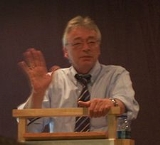
Hans-Hermann Hoppe
Overview
Hans-Hermann Hoppe is an Austrian School
economist
of the anarcho-capitalist
tradition, and a Professor Emeritus of economics at the University of Nevada, Las Vegas
.
Born in Peine
, West Germany
, he attended the Universität des Saarlandes in Saarbrücken
, and the Goethe University
, Frankfurt am Main, studying philosophy
, sociology
, history
, and economics
. His doctoral studies began with Marxist thought, under Jürgen Habermas
as his Ph.D advisor. However he quickly became disillusioned in this pursuit. He earned his Ph.D.
in Philosophy from the Goethe-Universität in 1974.
Austrian School
The Austrian School of economics is a heterodox school of economic thought. It advocates methodological individualism in interpreting economic developments , the theory that money is non-neutral, the theory that the capital structure of economies consists of heterogeneous goods that have...
economist
Economist
An economist is a professional in the social science discipline of economics. The individual may also study, develop, and apply theories and concepts from economics and write about economic policy...
of the anarcho-capitalist
Anarcho-capitalism
Anarcho-capitalism is a libertarian and individualist anarchist political philosophy that advocates the elimination of the state in favour of individual sovereignty in a free market...
tradition, and a Professor Emeritus of economics at the University of Nevada, Las Vegas
University of Nevada, Las Vegas
University of Nevada-Las Vegas is a public, coeducational university located in the Las Vegas suburb of Paradise, Nevada, USA. The campus is located approximately east of the Las Vegas Strip. The institution includes a Shadow Lane Campus, located just east of the University Medical Center of...
.
Born in Peine
Peine
Peine is a town in Lower Saxony, Germany, capital of the district Peine. It is situated on the river Fuhse and the Mittellandkanal, approx. 25 km west of Braunschweig, and 40 km east of Hanover.- History :...
, West Germany
West Germany
West Germany is the common English, but not official, name for the Federal Republic of Germany or FRG in the period between its creation in May 1949 to German reunification on 3 October 1990....
, he attended the Universität des Saarlandes in Saarbrücken
Saarbrücken
Saarbrücken is the capital of the state of Saarland in Germany. The city is situated at the heart of a metropolitan area that borders on the west on Dillingen and to the north-east on Neunkirchen, where most of the people of the Saarland live....
, and the Goethe University
Johann Wolfgang Goethe University of Frankfurt am Main
The Goethe University Frankfurt was founded in 1914 as a Citizens' University, which means that, while it was a State university of Prussia, it had been founded and financed by the wealthy and active liberal citizenry of Frankfurt am Main, a unique feature in German university history...
, Frankfurt am Main, studying philosophy
Philosophy
Philosophy is the study of general and fundamental problems, such as those connected with existence, knowledge, values, reason, mind, and language. Philosophy is distinguished from other ways of addressing such problems by its critical, generally systematic approach and its reliance on rational...
, sociology
Sociology
Sociology is the study of society. It is a social science—a term with which it is sometimes synonymous—which uses various methods of empirical investigation and critical analysis to develop a body of knowledge about human social activity...
, history
History
History is the discovery, collection, organization, and presentation of information about past events. History can also mean the period of time after writing was invented. Scholars who write about history are called historians...
, and economics
Economics
Economics is the social science that analyzes the production, distribution, and consumption of goods and services. The term economics comes from the Ancient Greek from + , hence "rules of the house"...
. His doctoral studies began with Marxist thought, under Jürgen Habermas
Jürgen Habermas
Jürgen Habermas is a German sociologist and philosopher in the tradition of critical theory and pragmatism. He is perhaps best known for his theory on the concepts of 'communicative rationality' and the 'public sphere'...
as his Ph.D advisor. However he quickly became disillusioned in this pursuit. He earned his Ph.D.
Doctor of Philosophy
Doctor of Philosophy, abbreviated as Ph.D., PhD, D.Phil., or DPhil , in English-speaking countries, is a postgraduate academic degree awarded by universities...
in Philosophy from the Goethe-Universität in 1974.
Quotations
[The] property right in one's own body must be said to be justified a priori, for anyone who would try to justify any norm whatsoever would already have to presuppose the exclusive right to control over his body as a valid norm simply in order to say "I propose such in such."![]()
The Economics and Ethics of Private Property (2nd edition, Ludwig von Mises Institute: 2006): 335

